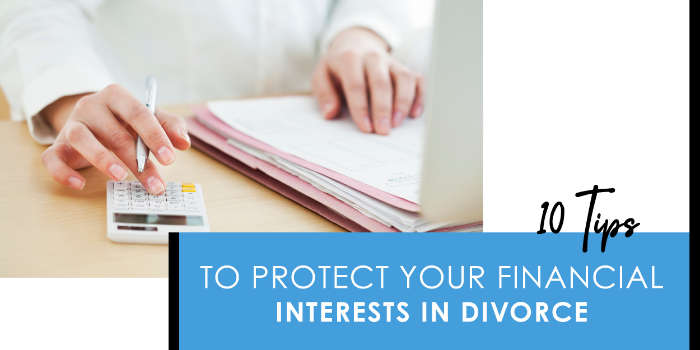10 Tips to Protect Your Financial Interests in Divorce
Going into a divorce can feel daunting, and while there’s often a lot more on the line than just money, like your children, knowing how to protect your financial interests will help create the best outcome for you and your family and ensure you have the financial security you need to start fresh in a new chapter once the divorce is final.
Give yourself a leg up with these ten tips to protect your financial interests in your divorce, whether through litigation, mediation, or another dispute resolution method.
1 Know what you’re working with.
The only way you can protect your finances is by being fully aware of what assets you have, what assets your spouse has, and getting the full picture of what will need to be separated. If you didn’t normally handle the finances in your marriage, ensure you can get access to your accounts so you know exactly what kind of money you’re working with.
2. Don’t hide money, but create separate bank accounts.
While you might have the instinct to hide some money away as a safety net for you, these kinds of discoveries during divorce can only make the process more contentious. Be honest about what money you have, and don’t hide anything, but it’s smart to create separate bank accounts if you haven’t already.
3. Get your own copies of all financial paperwork.
Don’t rely on your spouse to provide all of the financial paperwork. Get your own copies of financial statements and account balances so you can ensure everything is fairly and accurately presented.
4. Build and safeguard an emergency fund.
Create an emergency fund for yourself, ideally in your separate bank account, to ensure you have liquid assets in case of an emergency. This money should be yours, not coming from a shared source, so there’s no debate about whom it belongs to.
5. Think about the tax impacts.
Think about the tax implications of how the assets will be divided. While you might think you’re getting a great deal by taking many assets, they may not yet be taxed, and you may be on the hook for that payment. On the other hand, some assets are tax-free, which could be of benefit.
6. Don’t get overly attached to the house.
People often get too attached to their house and let this attachment cloud their judgment, allowing them to sacrifice other valuable assets just to keep the home, which is ultimately not always the best deal.
7. Understand state laws.
Know what your state’s laws are surrounding divorce. Florida is a no-fault law, which means you can get a dissolution of marriage without placing blame or fault on one party. To petition for an actual divorce, you must prove your marriage is, by law, “irretrievably broken.”
8. Prioritize.
Prioritize what is most valuable and important to you. Is it the house? The stocks? The family business? Allow these priorities to guide you.
9. Choose the most appropriate type of divorce for your situation.
For heavily contested divorces, litigation may be necessary. However, alternative dispute resolution formats such as divorce mediation may give you a better opportunity to reach a mutually agreeable and fair settlement.
10. Choose the right team.
One of the most important keys to protecting your finances in a divorce is working with the right team of experts, such as the divorce mediation team at Natalie Baird Mediations. As a Supreme Court Certified Family Law Mediator, Natalie Baird helps her clients reach agreeable settlements through both in-person and virtual divorce mediation.
Reach out to get started or schedule a mediation.

